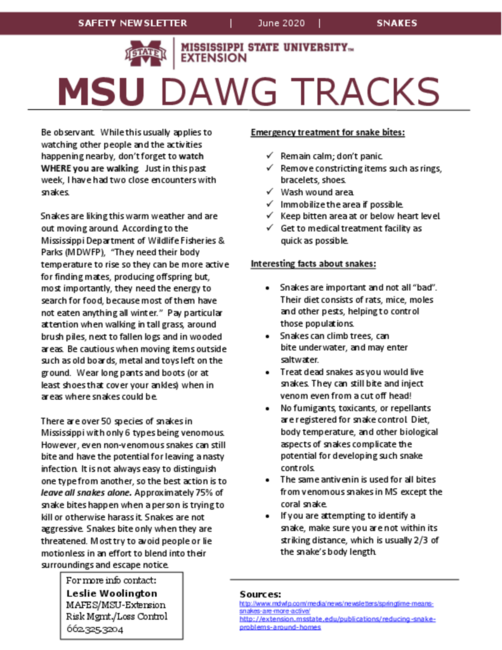Dawg Tracks Safety Talk
SNAKES
Be observant. While this usually applies to watching other people and the activities happening nearby, don’t forget to watch WHERE you are walking. Just in this past week, I have had two close encounters with snakes.
Snakes are liking this warm weather and are out moving around. According to the Mississippi Department of Wildlife Fisheries & Parks (MDWFP), “They need their body temperature to rise so they can be more active for finding mates, producing offspring but, most importantly, they need the energy to search for food, because most of them have not eaten anything all winter.” Pay particular attention when walking in tall grass, around brush piles, next to fallen logs and in wooded areas. Be cautious when moving items outside such as old boards, metal and toys left on the ground. Wear long pants and boots (or at least shoes that cover your ankles) when in areas where snakes could be.
There are over 50 species of snakes in Mississippi with only 6 types being venomous. However, even non-venomous snakes can still bite and have the potential for leaving a nasty infection. It is not always easy to distinguish one type from another, so the best action is to leave all snakes alone. Approximately 75% of snake bites happen when a person is trying to kill or otherwise harass it. Snakes are not aggressive. Snakes bite only when they are threatened. Most try to avoid people or lie motionless in an effort to blend into their surroundings and escape notice.
Emergency treatment for snake bites:
✓ Remain calm; don’t panic.
✓ Remove constricting items such as rings, bracelets, shoes.
✓ Wash wound area.
✓ Immobilize the area if possible.
✓ Keep bitten area at or below heart level.
✓ Get to medical treatment facility as quick as possible.
Interesting facts about snakes:
- Snakes are important and not all “bad”. Their diet consists of rats, mice, moles and other pests, helping to control those populations.
- Snakes can climb trees, can bite underwater, and may enter saltwater.
- Treat dead snakes as you would live snakes. They can still bite and inject venom even from a cut off head!
- No fumigants, toxicants, or repellants are registered for snake control. Diet, body temperature, and other biological aspects of snakes complicate the potential for developing such snake controls.
- The same antivenin is used for all bites from venomous snakes in MS except the coral snake.
- If you are attempting to identify a snake, make sure you are not within its striking distance, which is usually 2/3 of the snake’s body length.
Sources:
